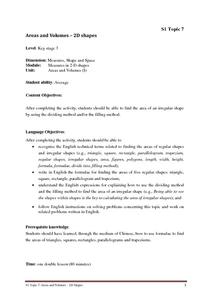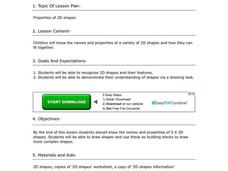Curated OER
Branding Circles, Squares, Rectangles, Triangles
Compare and classify 2-D shapes! Kindergarteners inspect the attributes of plane shapes and examine shapes in everyday life. They label the circles, squares, rectangles, and triangles they find. This is the website where you can find the...
Curated OER
Living in a Geometrical World
Students participate in a series of hand-on, online, and multimedia activities to examine 2 dimensional and 3 dimensional shapes. They describe common geometric solids. They construct rectangular prisms using straws and ribbon.
Government of Hong Kong
Areas and Volumes - 2D Shapes
Unfortunately for young mathematicians, the world isn't made entirely of parallelograms, triangles, and trapezoids. After first learning the area formulas for these common shapes, students apply this new knowledge to...
American Museum of Natural History
Thinking in the Three Dimensions
Discover different dimensions with paper folding. Pupils first read about zero, one, two, and three dimensions, and then learn about the fourth dimension, time. They then use origami to create models of shapes in three dimensions and use...
Curated OER
Lao Design: Lotus Flower Constructions
Students create lotus flowers in 3-D designs applying Lao art techniques. Following a teacher demonstration, they assemble their own lotus flower candleholders and the teacher arranges a group flotation in a body of water. Students...
K-5 Math Teaching Resources
Mini Math Word Wall
Provide a little extra support for your emerging mathematicians with a personal word wall. Including graphics and images that support children with learning to count, identify colors and shapes, and read high frequency words,...
Curated OER
What Shapes Can You See?
Students investigate shapes in art. In this visual arts lesson, students examine the ancient Panamanian "Plaque" and identify the geometric shapes in the art piece. Students combine basic shapes to make an artistic picture of their own.
Curated OER
2: Isle of Shapes - Based on the Puerto Rico Quarter Reverse
Learners identify both two and three-dimensional shapes. In this geometric shapes instructional activity, students listen to a teacher led instructional activity about the island of Puerto Rico. They look at the symbols and shapes on...
Curated OER
Three- and Two- Dimensional Geometry
In this three- and two- dimensional geometry worksheet, 7th graders solve 12 various problems related to geometric shapes and measurement. They first use paper and a pencil to sketch the front, side, back, top and bottom views of each...
Curated OER
Solid Shapes
In this geometric solids activity, students examine 4 different solid shapes then record the number of faces, the number of edges and the name of each shape.
Curated OER
Circles 1, 2, 3, 4
Here is a way to help your charges identify circles and spheres. In this shapes geometry and technology lesson plan, students identify and draw circles and explain the related attributes. They recognize circles and spheres while...
Curated OER
Making Two-Dimensional Shapes
Find the shapes that fit. Pupils explore visual discrimination in a set of geometry worksheets, which has them examine shapes that have been divided in half. They observe a set of shapes to determine which of them would fit into each...
Curated OER
Using the Web to Explore Shapes
Third graders research the Internet to locate geometric designs in familiar buildings. They review shapes, solids, angles and symmetry as they research websites of familiar buildings in Louisville. They record the information they see...
Curated OER
Attributes of Shapes
Not all circles look the same! Expose shapes with the same name but different attributes through a matching exercise. Learners examine five shapes, matching them with a second set. For each, there is a shape bearing the same name, yet...
Curated OER
Perimeter of Polygons in Word Problems
Peruse these perimeter word problems with beginning geometers, possibly projecting it as an all-class warm up. There are three scenarios here, each with a visual. Scholars determine the perimeter of a swimming pool, find the missing...
Curated OER
Which One Could Make This Shape?
Explore two and three-dimensional shapes. Learners first examine three 2-D shapes and determine which of three 3-D figures could have made that shape. The wording here is a bit confusing; make sure your kids understand what it is...
Curated OER
A Shapely Activity
Fifth graders explore polygons in various shape activities. For this polygons lesson, 5th graders discuss and identify polygons by their number of sides. Students sort ceramic tiles by the number of sides on each piece. Students explore...
Curated OER
Combine Plane Shapes
In this early childhood math practice worksheet, students examine 3 shapes and then select the blocks that they would use to build a similar shape.
Curated OER
I Spy Shapes
Students play a game in which they name geometric shapes. In this geometric shape instructional activity, students ask "yes and no" questions to determine which shape one of their classmates has chosen. They ask questions that lead them...
Curated OER
2D Shapes Quiz
In this 2D shapes quiz worksheet, students use their math skills to respond to 10 short answer questions pertaining to 2D shapes.
Curated OER
Professor Panda's Puzzle of Shapes
In this number puzzle worksheet, 5th graders use multiplication and division to fill in the missing numbers. They examine a key and fill in the shapes with the numbers that make each puzzle true.
Curated OER
Properties of 2D Shapes
Second graders determine how to name two-dimensional shapes by their properties. In this two-dimensional figure lesson, 2nd graders work in two groups. They work with the teacher to examine two-dimensional shapes and complete a...
EngageNY
Cones and Spheres
Explore methods for finding the volume of different three-dimensional figures. The 20th instructional activity in the 25-part series asks learners to interpret diagrams of 3-D figures and use formulas to determine volume. Scholars must...
Curated OER
Perimeter All Around
Young scholars explore perimeter and area of regular and irregular polygons. They experiment with color squares and create different arrangements using the same number squares. Then they compare the area and perimeter measurements of each.























